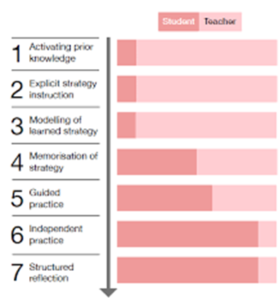The Music Partnership – Sliver Award
We are delighted to announce that Eaton Park has been awarded the Excellence in Music…
At Eaton Park Academy, our staff have a sound understanding of how our children learn best and we are determined as a school to develop our children’s thinking skills and how they use these skills to learn. Ensuring that our children leave us with a secure understanding of how they learn and can call upon a bank of strategies to support them is integral to us to support their learning behaviours and strategies.
Research carried out by The Educational Endowment Foundation’s (EEF) on Metacognition underpins our thinking in school. Metacognition is defined as not simply “thinking about thinking”; it is much more complex than this.
https://educationendowmentfoundation.org.uk/education-evidence/guidance-reports/metacognition
Metacognition is actively monitoring one’s own learning and, based on this monitoring, making changes to one’s own learning behaviours and strategies. A metacognitive approach typically focuses on allowing the learner to take control of their learning; however, our staff have a fundamental role in this in ensuring our children develop their own metacognitive skills. For our pupils to become metacognitive, self-regulated learners, we must:


Metacognitive skills are developed from an early age, as early as EYFS, and children are encouraged to plan, monitor, evaluate and make changes to their own learning behaviours.
Research demonstrates that metacognition must be explicitly taught; at Eaton Park, we recognise they are not innate skills and our children need lots of support from the teacher if they are to develop these skills. Our teachers have made children aware of what metacognition is and model the skills explicitly so that children can learn them for themselves. We model being metacognitive through the context of the lesson rather than stand-alone teaching as research supports this approach.
We use a seven-step guide when teaching metacognition in school:

We believe there are crucial strategies to use in the classroom that are conducive to effective metacognition:

Eaton Park Academy has been at the heart of our community for many years.
Our ambitious curriculum is shaped around the pupils and the community in which we serve.
Here you can find a collection of our latest news. We aim to keep all stakeholders as up-to-date as possible.
We are delighted to announce that Eaton Park has been awarded the Excellence in Music…
The government has launched a national campaign to remind parents and carers of the importance…
At Eaton Park Academy, ensuring the safety of our beloved students is our utmost priority.…
Tuesday 30th January 2024: Year 1 took part in our Kings and Queens workshop! 🫅👸…
Monday 29th January 2024: Year 5 travelled back in time to the Tudor Period to…
What fantastic trips to Chester Zoo Eaton Park has had! 🤩 The trips during the…
🏃🏼♀️🏃🏻♂️🏆Sportshall Athletics 🏆🏃🏻♂️🏃🏼♀️ On Monday 20th November, Eaton Park’s Sportshall Athletics team travelled to Fenton…
Yesterday, 80 families attended the Bread and Butter Thing @ The Bentilee Family Hub. A big thank you to all the volunteers,…
Alpha Academies Trust are very excited to be part of the collaborative approach to the…
If you require a paper copy of any of the pages / documents published on this website, please click here and complete the form stating which page(s) / document(s) you require along with your name and address.